Cost-Benefit Analysis of Renewable Power under Full Subsidy Targeting Law Enforcement Conditions in Iran
Cost-Benefit Analysis of Renewable Power under Full Subsidy Targeting Law Enforcement Conditions in Iran
Cost-Benefit Analysis, Sensitivity analysis, Renewable Power, Subsidy Targeting Law COMFAR,
- Başlangıç: 2011
- Yayıncı: İlhan ÖZTÜRK
Electricity Consumption and Economic Development in Nigeria
Adeyemi A. Ogundipe, Opeyemi Akinyemi, Oluwatomisin M. Ogundipe
Reconstructing Renewable Energy: Making Wind and Solar Power Dispatchable, Reliable and Efficient
Rizgar Abdlkarim Abdlaziz, Khalid Abdul Rahim, Peter Adamu
Could the U.S. Energy Sector Become New Engine For Growth?
Edward K. Zajicek, Nikolaos Karagiannis, Thomas Wilhoit
Which Energy-Growth Hypothesis is Valid in OECD Countries? Evidence from Panel Granger Causality
Economics of Palm Oil Empty Fruit Bunches Bio Briquettes in Indonesia
Mansoor MAİTAH, Petr PROCHÁZKA, Ales PACHMANN, Karel ŠRÉDL, Helena ŘEZBOVÁ
Examining the Double Dividend Effect of Energy Tax with the Overlapping Generations Model
